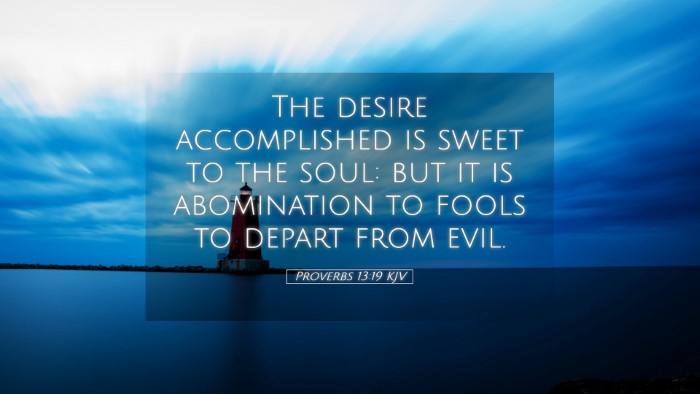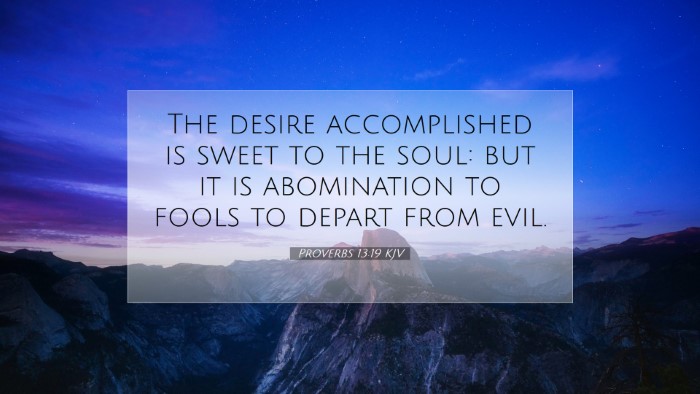Commentary on Proverbs 13:19
Proverbs 13:19 states: "The desire accomplished is sweet to the soul: but it is abomination to fools to depart from evil." This verse encapsulates the essence of human desires, fulfillment, and the contrasting nature of wisdom and folly, providing profound insight for pastors, students, theologians, and Bible scholars alike.
1. Desire and Fulfillment
Matthew Henry in his commentary remarks that the "desire accomplished" symbolizes the joy and satisfaction that comes when one's aspirations are realized. This phenomenon is not limited to mere worldly achievements but extends to spiritual and godly pursuits, suggesting that fulfillment in God’s will provides the ultimate sweetness to the soul.
- Spiritual Satisfaction: The completion of a righteous desire leads to an inner joy that transcends mere temporal happiness. As believers, the ultimate desire should be aligned with God's purposes, which brings deep satisfaction.
- Emotional Enrichment: Understanding that accomplished desires refresh the soul encourages individuals to seek God's will earnestly, fostering a closer relationship with the Creator.
2. The Role of Wisdom
Albert Barnes highlights that the pursuit of desires must be governed by wisdom. Just as fulfilling a righteous desire brings sweetness, the fulfillment of unrighteous desires leads to grave consequences. Not every desire is godly; therefore, wisdom is paramount in discerning which desires to chase.
- Distinction in Desires: True wisdom allows believers to differentiate between desires that glorify God and those that lead to spiritual decay.
- Guidance of the Holy Spirit: The Spirit plays an essential role in guiding believers toward holy desires that yield eternal rewards.
3. The Nature of Fools
Adam Clarke expands on the contrasting statement, “it is abomination to fools to depart from evil.” He emphasizes that the fool, or the wicked person, is characterized by an unwillingness to turn away from evil. This behavior reflects a fundamental misunderstanding of true fulfillment.
- Foolishness Defined: Clarke points out that folly stems from a lack of understanding and a refusal to accept wisdom. Thus, fools see repentance and righteousness as burdensome rather than liberating.
- Destructive Path: The continuation in sin and the rejection of salvation lead to ultimate despair, contrasting sharply with the sweetness experienced by the wise.
4. The Broader Biblical Context
This verse aligns with the broader themes found throughout the book of Proverbs, juxtaposing wisdom against folly. Proverbs consistently warns of the dangers of remaining entrenched in wickedness while highlighting the blessings that follow the pursuit of righteousness.
- Theme of Righteousness: Throughout Proverbs, the path of righteousness leads to life, prosperity, and favor from God. Proverbs 3:5-6 affirms the importance of trusting in the Lord for guidance.
- Consequences of Foolishness: The ultimate folly lies in ignoring the call to righteousness. Proverbs often depicts the fate of fools as one of destruction—underscoring the eternal impacts of earthly decisions.
5. Practical Applications
For pastors, students, and theologians, this verse serves as a launching point for discussing the nature of desires in the congregational context. Here are several applications:
- Encouragement of Righteous Desires: Preachers should exhort their congregations to pursue godly desires actively, fostering a culture of uplifting goals that glorify God.
- Mentoring to Depart from Evil: Pastoral care must include substantive mentorship in helping individuals identify and turn away from sinful practices that hinder their spiritual growth.
- Education on Wisdom: Teach on the nature of wisdom as outlined in Proverbs, focusing on how it shapes desires and guides decision-making.
Conclusion
Proverbs 13:19 serves as a poignant reminder of the joy found in the realization of godly desires. It encourages believers to measure their pursuits against the wisdom of God’s word and to refrain from foolishness that leads to spiritual emptiness. The interplay between desire and fulfillment, wisdom and folly, compels a thoughtful response to life’s choices, ultimately guiding individuals toward a life that honors God and fulfills His design for humanity.


